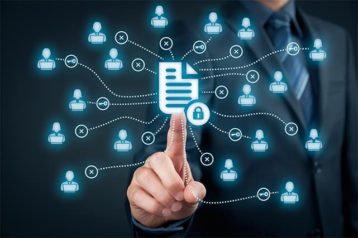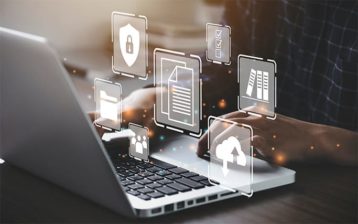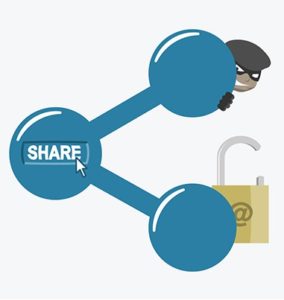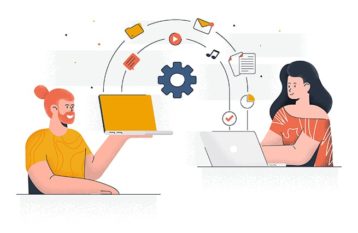To prevent unauthorized individuals from gaining access to data, data sharing requires a high level of confidentiality and control. Consequently, approaches for data sharing have evolved. Recent software advances have improved data security and facilitate more efficient data sharing. In the digital world, data sources can include website visitors, source codes, investigative data, marketplaces, etc. Consequently, data must be trustworthy, protected, and of high quality. Technological advancements have enhanced data sharing in several ways, including speed, security, quality, and scalability.

Table of Contents
What is Data Sharing?
Data sharing is simply making the same data resource accessible to numerous users or applications. Data sharing grants authorized access to the information within an organization or with external parties. An efficient data-sharing system must be open and accessible to those who require the data. Similarly, organizations need an efficient data sharing strategy to make data accessible for strategic corporate decision-making.
What is the importance of data sharing?

In every industry, data plays a vital role. An organization needs a credible method of data sharing that makes pertinent data accessible when required. When there is uninterrupted data exchange in an organization, stakeholders can make decisions focusing on profitability, which creates new business opportunities. Organizations and public bodies can share more data in a secure, fair, legal, and respectful manner of the data subjects’ rights.
Data sharing may be economically advantageous for governments. The availability of data from the appropriate source could aid in addressing a variety of contemporary social issues. Similarly, the exchange of data between businesses and governments can assist governments in making the best decisions.
What are the different kinds of Data Sharing?

Different types of data sharing exist based on the industry involved. Educational institutions share data for research reasons. This sort of data sharing entails collecting data from relevant sources to enhance and promote knowledge about a topic.
Data sharing in banks is another type that might focus on different purposes, modes of transmission, and results. The objective of data sharing in banks may be to gain knowledge of customers’ perspectives on services and future decisions or enhance operations. Similarly, small businesses may share data to gain insight into client behavior or boost company visibility. Similarly, data sharing for governments might be for economic purposes. Different sectors may exchange pertinent data with the government to aid in the government’s decision-making for social and economic growth.
Note:
However, depending on the systems where data sharing is performed, there might be varying degrees of data sharing. For example, data sharing could be electronic data processing, decision support systems, and management information systems.How does data sharing work?
Data sharing works based on the following techniques and factors.
- Transparency
- Flexibility
- A common view
- Speed
- Functional encryption
- Secure multiparty computation
What are the advantages of Data Sharing?

Data sharing has various advantages that contribute to the growth of all sectors. The elimination of barriers is a key advantage of data sharing. Lack of access to essential data hinders the productivity of most employees in a business. However, with data sharing, employees will be able to access the necessary data and work more efficiently.
Sharing information also allows businesses to acquire a competitive edge. Access to useful data is the foundation of successful company strategies. When a company assures data exchange among stakeholders and employees, everyone is capable of thinking analytically about how to boost overall return on investment.
Data sharing enables businesses to uncover significant data assets, enhancing employee cooperation and productivity. Businesses may discover new prospects through healthy teamwork. Finally, sharing information decreases inefficiencies, resulting in a healthier bottom line. Many employees and organizations make decisions based only on the resources available. But when data is shared openly, users will be progressively productive.
What are the disadvantages of Data Sharing?

Conversely, data sharing can be devastating for company objectives. Sharing information could expose firms to the risk of cyberattacks. When professionals exchange data, everyone has access to the data from different locations and devices. Consequently, this may expose company data to alteration, malware, or unwanted access.
Organizational data may be disclosed to the general public, which is another drawback of data sharing. When data is shared, and all employees within a company have access, employees may inadvertently leave data accessible to anyone.
Who uses data sharing?

First, what is data? Data are essential decision-making components. Consequently, all professions and individuals whose job efficacy or relevant outcomes depend on data for decision making need data. Researchers, businesses, governments, financial organizations, journalists, etc., are all examples of data users. Regardless of who is sharing the data, it is important that all users follow guidelines on sharing data.
Is it safe to share data?

No, data sharing is often unsafe and companies must exercise caution when exchanging data. Data exchange requires a high level of security. Some individuals may be negligent to cybersecurity measures when sharing a company’s data. This carelessness may expose organization data to unauthorized access. With this said, many individuals and organizations share data regularly in a safe and secure manner.
Do VPNs share user data with third-party institutions?
VPNs do not share user information with third parties. A VPN encrypts all of the user’s online traffic. In addition, certain VPNs do not log user activity, thereby securing user data. Some free VPNs have been known to share user information with third parties in the past, however, so it is important to avoid free VPNs when data security is a primary concern.

